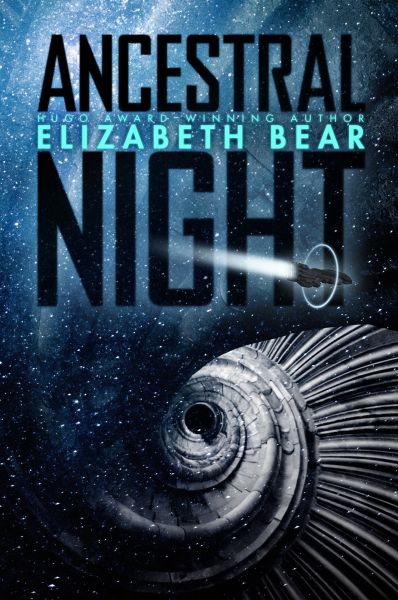I Ran All Night and Day
Ancestral Night (White Space, volume 1)
By Elizabeth Bear

19 Dec, 2019
2019’s Ancestral Night is the first volume in Elizabeth Bear’s White Space series. It shares a universe with her earlier Jacob’s Ladder sequence1.
Halmey Dz and her partners (the starship Singer and Connla Kurucz) make a precarious living searching out lost starships. They’ve had a run of bad luck; one more failure and they may lose their government subsidy.
On the other hand, the wrong lost starship could kill them.
Their latest quest leads them to the site of an atrocity.
The Ativahika are vast living starships. Aloof and uncommunicative, they are presumed to be intelligent, though there is little evidence that they are. Nevertheless, the interstellar government, the Synarche, regards them as people; those who would kill and harvest materials from the Ativahika are criminals.
Roaming Jothari killed an Ativahika and were themselves killed. Some unknown party vented the harvester ship’s air into space, killing all the crew. Unknown party gone, the corpse drifts. Until the Singer finds it.
The crew of the Singer are hoping for a bountiful payoff. What they get is an upload of alien tech, straight into Dz. This turns Dz into a target. Among the hunters: Zanya Farweather, agent of the Autonomous Collective Republic of Freeports.
Citizens of the Synarche prefer to call the Republic the Republic of Pirates. Obviously, the Synarche government is superior because it does its best to ensure that every citizen has a rewarding niche. This sometimes means that minds must be shaped to fit that niche, but only with informed consent. (Sometimes a bit of benevolent urging is needed.) The Republic of Pirates embraces FREEDOM! Specifically, the freedom of the strong to oppress the weak.
The Singer has something the Republic wants. The Republic isn’t the sort of brutal, quasi-libertarian dystopia to let prey escape. Farweather is sure that if she plays her cards correctly, her prey might come to her of her own free will.
Whatever free will means.
~oOo~
Two complaints, the first of which is no way the author’s fault. I read this on my Kobo. Normally a Kobo allows one to reset fonts to fit one’s tastes and eyesight. This ebook did not cooperate. The publisher’s preferred font was close to illegible for my subpar vision.
The second complaint: the author’s inane science. Some of it strained my credulity. Some of this is down to scale issues in no way peculiar to this author: in a galaxy of billions of stars, a galactic government with thousands of occupied systems is not really galactic. In a universe billions of years old, relics only tens of thousands of years old are not really ancient.
What I liked2:
The Synarche is one of those multi-species federations that tries to take care of all its citizens. This is not always successful; the Synarche makes one big mistake that drives the plot. But nobody dies because they were denied basic services. Now you may be expecting the narrative to suddenly reveal that nanny states are bad, bad, bad, but the author doesn’t do that. There’s the odd corrupt functionary and one big fuck-up, but otherwise, the Synarche is as benign as advertised.
This isn’t to say that every citizen can expect a happy life. Dz is something of a Misfit Toy. Born far off the norm in the clone-family version of Westborough Baptist Church. She relies on cognitive duct tape to keep her preferred version of herself from cracking apart. She makes full use of available therapeutic resources rather than powering through until something breaks (as normal people do). Good for her.
Farweather in contrast is the does-what’s‑necessary sort of agent who is the hero in many narratives. Not this one.
Once again, I find myself reading a novel about a starship whose crew is a found family that gets tangled up in grand adventures. It could be a Traveller game, a Becky Chambers novel. What is this genre called?
Ancestral Night is available here (Amazon US), here (Amazon Canada), here (Amazon UK), here (Book Depository), and here (Chapters-Indigo).
1: Her Jacob’s Ladder series consists of Dust(2008), Chill (2010), and Grail (2011).
2: For those of you who read the series referenced in footnote 1: I enjoyed discovering that the Great Disaster in the Jacob’s Ladder series turned out to be survivable, whereas heading off into the deep dark in a flotilla of sub-light ships did not. Some of you may not find that funny but I do.
